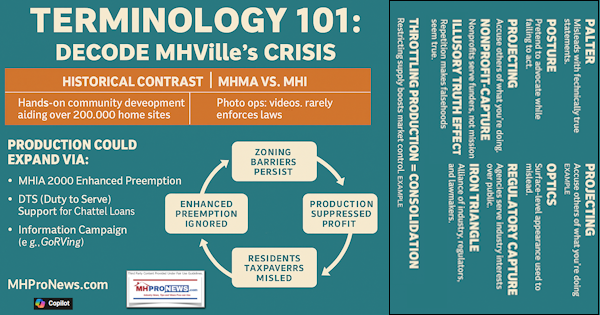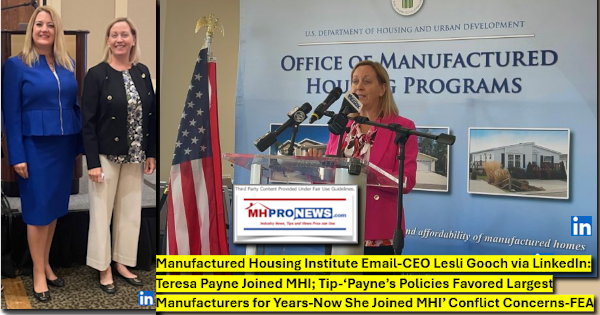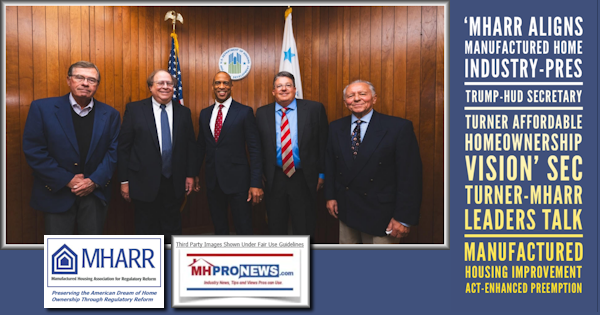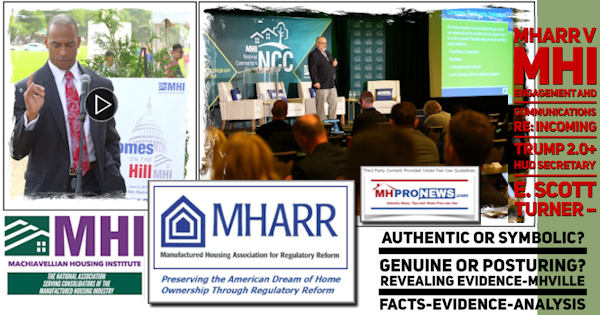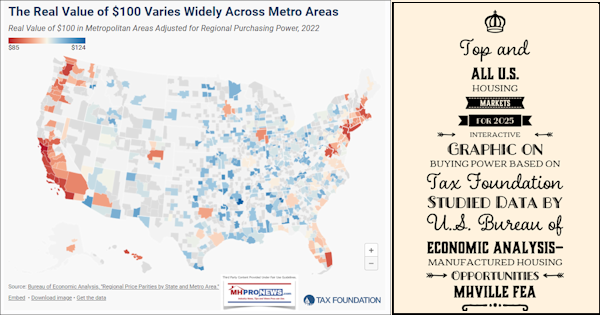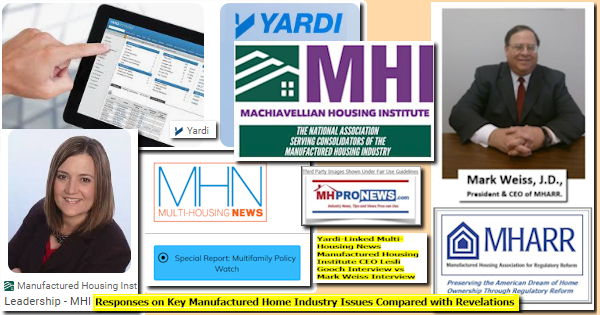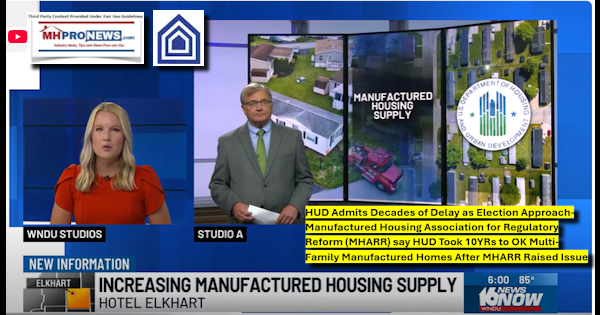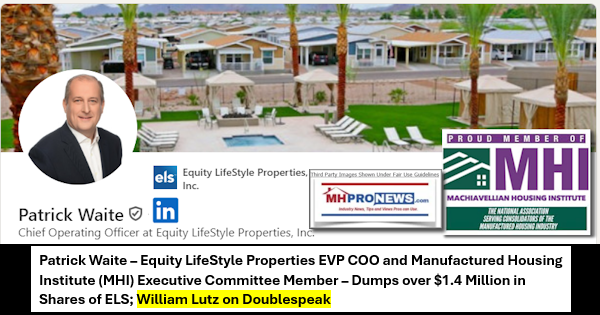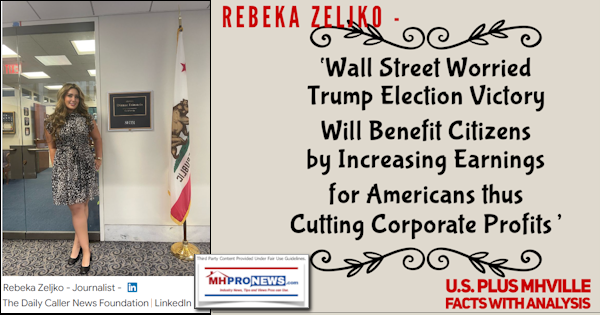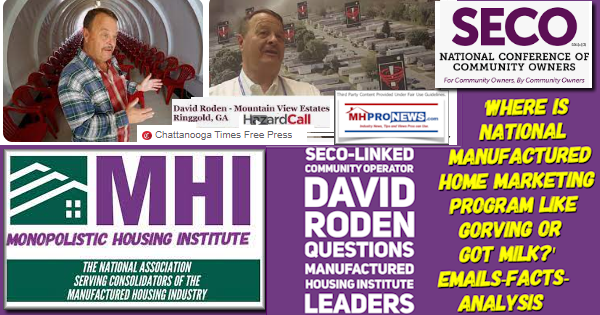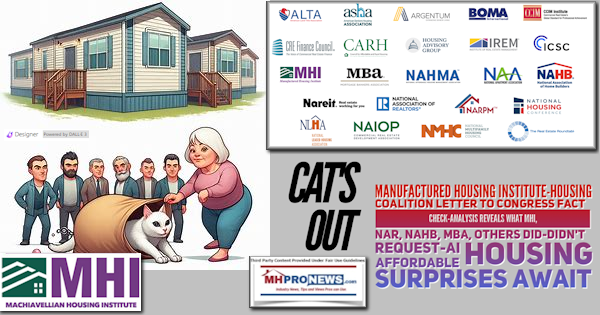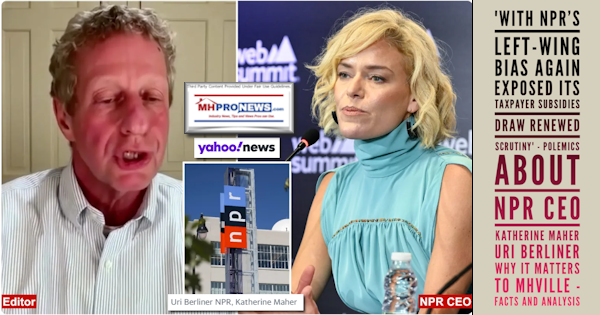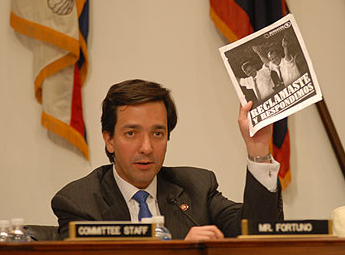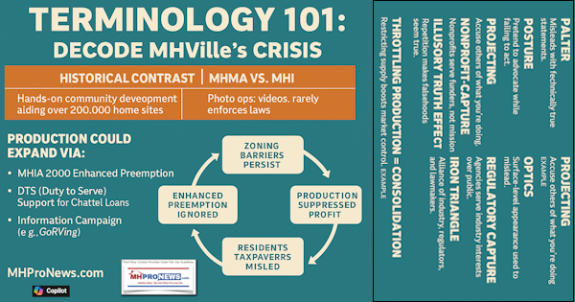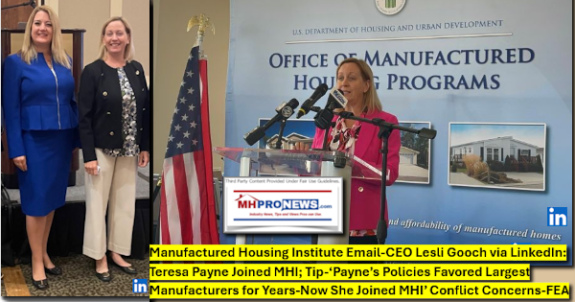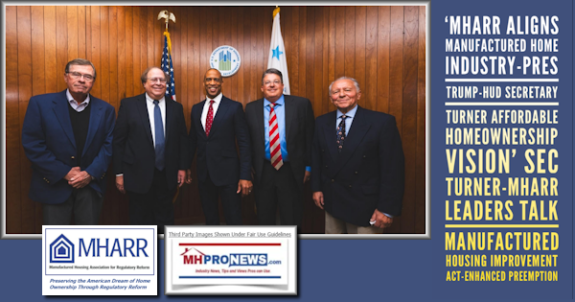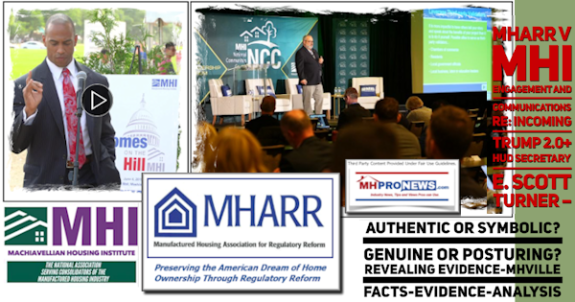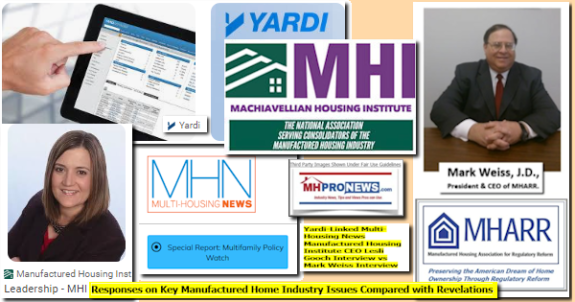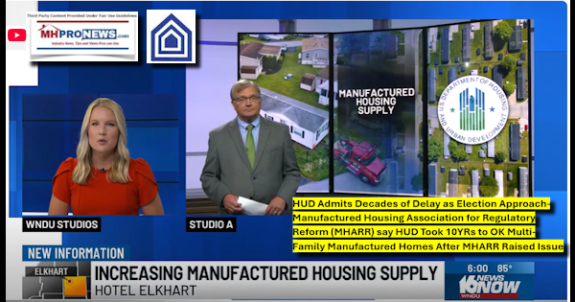There are leaders of companies of all sizes involved in the Manufactured Housing Institute (MHI). Some are huge in MH, others as small as one person and all sizes in between. We routinely get questions related to MHI’s decisions, communications, actions or the seeming ‘absence of action’ which we’ll explore for the next few minutes.
Paraphrasing some common ones:
-
What is MHI’s game plan for a more robust MH Industry recovery?
-
Are MHI’s main foci “lobbying and regulatory” in nature?
-
As good as the info or networking at MHI meetings are, is there something beyond meetings and lobbying?
-
Does the leadership at MHI see all the opportunities and risks: in the marketplace, with not-for profits, media and from regulators?
-
What happens if MHI’s lobbying efforts and plans come up short? What’s their plan B?
-
Tony, can you get MHI to do X (whatever the caller’s or writer’s “x” happens to be…, and the short answer is mostly, not likely).
Yes, the above are paraphrases, but if you look closely at some of the articles on Industry Voices over the months or years, or a number of featured articles written by others under their own names,what emerges are exactly these noted concerns and more, only politely said or muted. So this is NOT new.
Example; when a respected industry pro points out publicly and in writing that half the states in the U.S. are still going backwards on new  MH shipments, isn’t that a troubling warning sign?
MH shipments, isn’t that a troubling warning sign?
When –
-
affordable quality housing is in high demand in the U.S. and world-wide,
-
billions in investments could be coming into MH (some potentially via MHI to members…),
-
and MH and MHI are routinely not considered for projects, aren’t those warning signs too?
Disclosure
Disclosure being made at a Congressional hearing,
credit WikiCommons.
Before proceeding, as a disclosure:
-
that I’m an MHI member,
-
was elected to the board of the MHI Suppliers Division,
-
and pay dues like hundreds of other professionals or businesses do. Furthermore,
-
our firm’s parent operation has done contracted services for MHI,
-
The fact that key people connected with MHI thank us privately and publicly (see footnote 1), suggests they like want we’ve done for them and/or for the industry in our publishing and other services.
That said, let’s proceed.
The Other Networks…
The Manufactured Housing Association for Regulatory Reform (MHARR) is one of over 50 national, state or regional communities focused associations in MH or modular homes. While many walk hand-in-hand publicly with MHI, that doesn’t mean that off the record (or sometimes, rather publicly, on the record), they agree with all that MHI does.
In fact, a MHARR member reminded me recently they exist precisely because decades ago, their members didn’t feel properly represented by MHI, and so they formed their own group that exists to this day.
What is the MHI End Game?
Do you play chess? If not, ask a good chess player you know to explain “the opening, middle and end game,” or read up on it on a source such as Wikipedia. MHPros, would be and current investors, media, and outside but interested parties often ask your Masthead scribe,
-
What is MHI’s end game?
Others may ask similar, but differently,
-
what are the short, mid and long term goals for MHI?
To maintain balance, let it be known that MHI does put out a few statements every month. They do put out an annual or periodic “score card” on their lobbying efforts and results. Whenever we publish a guest column, like Jason Boehlert‘s on behalf of MHI, or other articles on/by MHI that are featured, they are routinely well read.
But that is the flip side of another common comment (complaint?). “MHI fails to communicate often or clearly on key things in a fashion that keeps the industry-at-large informed.” I’ve had MHI members – who aren’t dual MHARR members – say that MHARR out-communicates MHI.
I frankly hear concerns from those within MHI’s ranks to exactly these and other points raised in this column. So these aren’t whines from the side-lines by the disgruntled, rather they are water-cooler, email, phone, dinner and bar talk by MHI members and beyond.
Concerns on some topics related to MHI are so hot that I think it prudent not to mention them specifically at this time. The goal today isn’t to pen a post that looks like a nuclear attack – remember, we’re about solutions, not problems here – so let’s focus on the concerns in general and see where those lead us, okay?
“Inexplicable!”
“Tony, some of what MHI does or fails to do is maddeningly inexplicable.”
None of this is to throw rocks, because I’m on an MHI board too. It’s shared because pros in our industry – or those keenly interested in MH and our future – often shake their heads in wonder.
My private response is there are certainly good efforts like HR 1779/S 1828; MHI and the leadership deserve credit for getting more traction on these than any other legislation to date I’m aware of to “reform the reform” of Dodd-Frank. That’s not to be taken lightly! So let’s be fair. There are successes.
But there are state associations that – objectively speaking – are arguably doing a better job with often more limited resources than the national.
To be more specific would be unfair, but to say those associations are routinely engaged with MHI makes the point I also make in private. Let’s not throw out the baby with the bath water.
Whatever is missing or is wrong, let’s work together to fix and improve it.
We have to improve what is good, and fix what is lacking.
I’m not going to offer a specific set of suggestions or conclusions; that’s up the leadership and industry members like yourself.
We as industry pros will make it through this rebirthing period, regardless if MHI makes changes or doesn’t. Our MH industry will grow, period and exclamation point!
Individual companies will continue to thrive (or not), based upon their corporate efforts and those of other associations.
Hari kari – image credit, silverdoctors.
So unless we collectively commit dishonorable ‘hari kari,’ Manufactured and Modular Homes are going to play a key role in the future of American Housing.
But if MHI listen to and adapts, as these voices suggest, many more will prosper and benefit and will do so more rapidly.
If they fail to address the growing chorus of quietly voiced concerns, nature abhors a vacuum. ##
We could point to a number of comments in writing or via video that underscore the fact that MHI thinks we are “fair and balanced” here at MHProNews in our coverage and are pro-industry in all of our work.
Examples are the closing comments on videos with prior MHI Chairman Joe Stegmayer, or MHI President Dick Jennison; or in writing by others – many are MHI members at this link – that make that point.
Footnote 2)
Along the lines of industry education and events, ironically, MHI has brought in fine speakers like Chris Fisher of Drucker Worldwide, or author Ken Segall of Apple marketing fame. Watch and listen to their interviews, and then ask the question. “6 months later, which of these suggestions has MHI publicly taken up?”
Footnote 3)
Let me partially answer that last question by saying that the MHI Supplier’s Division has taken up the issue of image in a proposed video project, as is reflected in MHI’s own annual meeting report, linked here.
(Image credits: WikiCommons, MHProNews and silverdoctors)
Editor’s Note:
Your Invitation to Sound Off!
We are routinely asked to ‘push’ MHI on this or that topic, and routinely refrain from doing so for a variety of reasons.
With this column, we’ll see if:
-
others who’ve asked me to sound off for them will now come forward more clearly and directly in their own public statements on what they think MHI needs to do,
-
or if MHI will come forward and answer some of these questions and concerns publicly to the industry, or
-
if MHI leaders will privately meet and resolve these and others festering concerns.
The point is, nature abhors a vacuum. Timely solutions are needed, or multi-billion-dollar opportunities will be missed.
Change will come, the question is how, when and with what results?
In fairness and closing, we know from our sources that MHI is and has been exploring options (some I’d agree with, others…?) but they’ve opted as of this point-in-time to hold those discussions very close to the vest.
Comments on this or other topics of industry interest – or or off the record – may be sent to this link. As always, comments are those of the writer, not necessarily reflective of sponsors or our parent firm.
If you opt to sound-off via email, please make it clear from your subject line if the comment is On the Record or Off the Record; thank you in advance as always for your tips, thoughts and insights. ##


